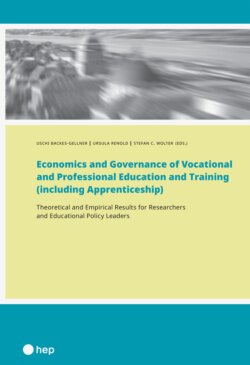Читать книгу Economics and Governance of Vocational and Professional Education and Training (including Apprenticeship) (E-Book) - Uschi Backes-Gellner - Страница 6
На сайте Литреса книга снята с продажи.
References
ОглавлениеAcemoglu, D., & Pischke, J. S. (1998). Why do firms train? Theory and evidence. The Quarterly Journal of Economics, 113(1), 79–119. doi:10.1162/003355398555531
Backes-Gellner, U. (1996). Betriebliche Bildungs- und Wettbewerbsstrategien im deutsch-britischen Vergleich: Ein Beitrag der Personaloekonomie zur internationalen Betriebswirtschaftslehre. Muenchen: Hampp.
Backes-Gellner, U., & Geel, R. (2014). A comparison of career success between graduates of vocational and academic tertiary education. Oxford Review of Education, 40(2), 266–291. doi:10.1080/03054985.2014.889602
Backes-Gellner, U., & Tuor, S. N. (2010). Avoiding labor shortages by employer signaling: On the importance of good work climate and labor relations. Industrial and Labor Relations Review, 63(2), 271–286. doi:10.1177/001979391006300205
Backes-Gellner, U., & Pfister, C. (2019). The contribution of Vocational Education and Training to innovation – The case of Switzerland. Bern: SERI. doi:10.5167/uzh-183335
Backes-Gellner, U., Rupietta, C., & Tuor Sartore S. N. (2017). Reverse educational spillovers at the firm level. Evidence-based HRM, 5(1), 80–106. doi:10.1108/ebhrm-03-2015-0007
Balestra, S., & Backes-Gellner, U. (2017). Heterogeneous returns to education over the wage distribution: Who profits the most? Labour Economics, 44, 89–105. doi:10.1016/j.labeco.2017.01.001
Becker, G. S. (1962). Investment in human capital: A theoretical analysis. Journal of Political Economy, 70(5), 9–49. doi:10.1086/258724
Becker, G. S. (1964). Human capital: A theoretical and empirical analysis, with special reference to education. New York: National Bureau of Economic Research.
Bertschy, K., Cattaneo, M. A., & Wolter, S. C. (2009). PISA and the transition into the labour market. LABOUR, 23,111–137. doi:10.1111/j.1467- 9914.2008.00432.x
Bolli, T., Caves, K. M., Renold, U., & Buergi, J. (2018). Beyond employer engagement: Measuring education-employment linkage in Vocational Education and Training programmes. Journal of Vocational Education and Training, 70(4), 524–563. doi:10.1080/13636820.2018.1451911
Bolli, T., Kemper, J., Parajuli, M. N., Renold, U., & Thapa, B. (2019). First report on the new dual VET-apprenticeship programme in Nepal: Formative assessment of the first cohort. KOF Studies No. 135. doi:10.3929/ethz-b-000345486
Bolli, T., Renold, U., & Woerter, M. (2018). Vertical educational diversity and innovation performance. Economics of Innovation and New Technology, 27(2), 107–131. doi:10.1080/10438599.2017.1314075
Caves, K. M., & Baumann, S. (2018). Getting there from here: A literature review of VET reform implementation. KOF Working Papers No. 441. doi:10.3929/ethz-b-000257741
Dionisius, R., Muehlemann, S., Pfeifer, H., Walden, G., Wenzelmann, F., & Wolter, S. C. (2009). Costs and benefits of apprenticeship training: A comparison of Germany and Switzerland. Applied Economics Quarterly, 55(1), 7–37. doi:10.3790/aeq.55.1.7
Eggenberger, C., & Backes-Gellner, U. (2020). IT skills, occupation specificity and job separations. Swiss Leading House Working Paper No. 172.
Eggenberger, C., Rinawi, M., & Backes-Gellner, U. (2018). Occupational specificity: A new measurement based on training curricula and its effect on labor market outcomes. Labour Economics, 51, 97–107. doi:10.1016/j.labeco.2017.11.010
Geel, R., & Backes-Gellner, U. (2011). Occupational mobility within and between skill clusters: An empirical analysis based on the skill-weights approach. Empirical Research in Vocational Education and Training, 3(1), 21–38.
Geel, R., Mure, J., & Backes-Gellner, U. (2011). Specificity of occupational training and occupational mobility: An empirical study based on Lazear’s skill-weights approach. Education Economics, 19(5), 519–535. doi:10.1080/09645291003726483
Greinert, W.-D. (1988). Marktmodell – Schulmodell – duales System. Grundtypen formalisierter Berufsbildung. Die berufsbildende Schule, 40(3), 145–156.
Harhoff, D., & Kane, T. J. (1997). Is the German apprenticeship system a panacea for the U.S. labor market? Journal of Population Economics, 10(2), 171–196. doi:10.1007/s001480050037
Lauterbach, U. (1995). Typen-, Kategorien- und Modellbildung von Systemen beruflicher Bildung. In Lauterbach, U. (Ed.), Internationales Handbuch der Berufsbildung (pp. 103–122), Baden-Baden: Nomos.
Mohrenweiser, J., Zwick, T., & Backes-Gellner, U. (2019). Poaching and firm-sponsored training. British Journal of Industrial Relations, 57(1), 143–181. doi:10.1111/bjir.12305
Muehlemann, S., Pfeifer, H., Walden, G., Wenzelmann, F., & Wolter, S. C. (2010). The financing of apprenticeship training in the light of labor market regulations. Labour Economics, 17(5), 799–809. doi:10.1016/j.labeco.2010.04.006
Muehlemann, S., Wolter, S. C., & Joho, E. (2018). Apprenticeship training in Italy – A cost-effective model for firms? Guetersloh: Bertelsmann Stiftung.
Mueller, B., & Wolter, S. C. (2014). The role of hard-to-obtain information on ability for the school-to-work transition. Empirical Economics, 46(4), 1447–1471. doi:10.1007/s00181-013-0709-2
Oswald, Y., & Backes-Gellner, U. (2014). Learning for a bonus: How financial incentives interact with preferences. Journal of Public Economics, 118, 52–61. doi:10.1016/j.jpubeco.2014.06.003
Rageth, L., & Renold, U. (2019). The linkage between the education and employment systems: Ideal types of vocational education and training programs. Journal of Education Policy, 27, 1–26. doi:10.1080/02680939.2019.1605541
Renold, U., Bolli, T., Buergi, J., Caves, K. M., Oswald-Egg, M. E., Kemper J. M., & Rageth, L. (2016). Feasibility study for a curriculum comparison in Vocational Education and Training, Intermediary report II: Education-employment-linkage index. KOF Studies No. 80. doi:10.3929/ethz-a-010696087
Renold, U., Caves, K. M., Maldonado-Mariscal, K., Oswald-Egg, M. E., Markovic, J., Veselinovic, Z. & Todorovic, M. (2019). Implementation of the Serbian law on dual education. First report on drivers and barriers in the pre-implementation phase. KOF Studies No. 129. doi:10.3929/ethz-b-000337794
Rinawi, M., & Backes-Gellner, U. (2020). Firms’ method of pay and the retention of apprentices. Oxford Economic Papers, 72(1). 262–291.doi:10.1093/oep/gpy074
Rupietta, C., & Backes-Gellner, U. (2019). How firms’ participation in apprenticeship training fosters knowledge diffusion and innovation. Journal of Business Economics, 89(5), 569–597. doi:10.1007/s11573-018-0924-6
Ryan, P. (2000). The institutional requirements of apprenticeship: Evidence from smaller EU countries. International Journal of Training and Development, 4(1), 42–65. doi:10.1111/1468-2419.00095
Sadowski, D. (1980). Berufliche Bildung und betriebliches Bildungsbudget: Zur oekonomischen Theorie der Personalbeschaffungs- und Bildungsplanung im Unternehmen. Stuttgart: Poeschel.
Tuor, S. N., & Backes-Gellner, U. (2010). Risk-return trade-offs to different educational paths: Vocational, academic and mixed. International Journal of Manpower, 31(5), 495–519. doi:10.1108/01437721011066335
Wolter, S. C., & Joho, E. (2018). Apprenticeship training in England – A cost-effective model for firms? Guetersloh: Bertelsmann Stiftung. doi:10.11586/2018008
Wolter, S. C., & Muehlemann, S. (2015). Apprenticeship training in Spain – A cost-effective model for firms? Guetersloh: Bertelsmann Stiftung. doi:10.11586/2016011
Wolter, S. C., Muehlemann, S., & Schweri, J. (2006). Why some firms train apprentices and many others do not. German Economic Review, 7(3), 249–264. doi:10.1111/j.1468-0475.2006.00155.x
